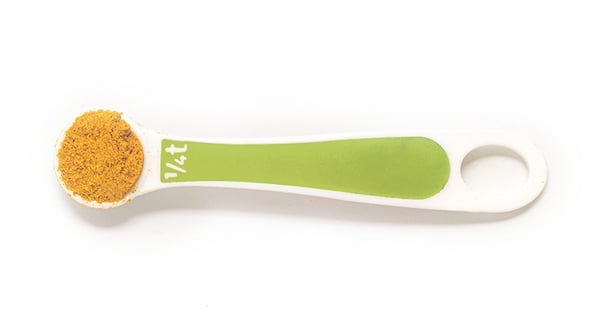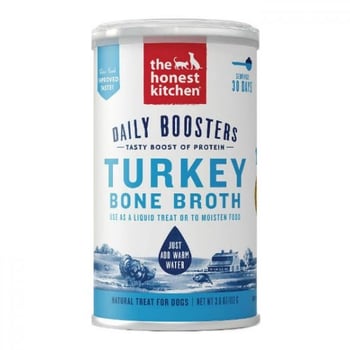
You want the best for your furry friend, and that includes top health and wellness supplements. While there is no shortage of dog supplements on the market, few provide as many advantages as turmeric for dogs. How much turmeric to give a dog?
Not only is turmeric for dogs effective against a variety of canine ailments, but it’s also relatively inexpensive and widely available. Learn more about turmeric good for dogs and how it can support your dog’s health.
What is Turmeric?
Is turmeric good for dogs? Absolutely. Turmeric is a potent, natural anti-inflammatory for dogs and an antioxidant. The plant’s use as a medicinal aid dates back nearly 4,000 years. It has not only been a principal spice in Southeast Asian cuisine but is also used in religious ceremonies. Turmeric for dogs is also often referred to as ‘Indian saffron'.
A South Asian native and part of the ginger family, curcumin is turmeric’s active ingredient. You are probably familiar with this orange-yellow powder, as it is a staple in curry products. Its taste ranges between slightly bitter and slightly sweet.
Turmeric for dogs is available in your local supermarket as a spice, but humans and dogs should consume medicinal turmeric to derive the best effects. Manufacturers of turmeric designed for cooking focus on taste, not heart health benefits.
Can Dog Eat Turmeric?
Yes, dogs can eat turmeric in small amounts, and it may even have health benefits. Turmeric contains curcumin, which has anti-inflammatory, antioxidant, and antibacterial properties. It may help with joint pain, digestion, and overall immune support.
It may seem like one of the more strange spices to give your dog, but the benefits speak for themselves. Stick to turmeric products made for dogs, rather than cooking spices, as turmeric often needs other ingredients to assist in digestion of it's benefits.
Benefits of Turmeric for Dogs?

Is turmeric good for dogs? Yes! Turmeric may help dogs dealing with mobility issues stemming from osteoarthritis, but that is just one of the herb’s many canine benefits. Turmeric can also boost your dog’s immune system and improve his skin and coat.
Curcumin is the key active ingredient in dog turmeric. Curcumin for dogs has a high concentration of anti-inflammatory properties and antioxidant properties, so it's a sought-after and natural supplement for managing reduced pain relief, joint issues, allergies, and more.
Because of its anti-inflammatory benefits, it can also be a helpful anti-inflammatory bowel disease aid. Reducing inflammation in the digestive tract can improve digestion and reduce discomfort.
Additionally, dog turmeric is an adaptogen. This means it can help your pooches body manage stress better, leading to less anxiety and more balanced energy. Your dog should gain more consistent energy, and that is especially useful for athletic or working dogs.
When combined with other natural health supplements every day, like fish oil for dogs or coconut oil for dogs, adding turmeric will contribute to better skin and coat health benefits of turmeric and help to minimize allergies and other skin reactions.
Turmeric for Senior Dogs
As the saying goes, old age ain’t no place for sissies. That is true for pet owners as well as people. The wear and tear of arthritis can strip cartilage from the joints, leading to pain and mobility issues.
The herb also shows promise in the battle against cancer. There are no studies currently underway involving turmeric safe and dogs, but clinical trials in humans are going on to help us determine the cancer-fighting effects of curcumin.
These studies are looking into whether it can be a possible treatment for pre-cancerous conditions if it can be used as a cancer treatment, and if it can reduce symptoms resulting from cancer treatment. Evidence is pointing to some cancers stemming from inflammation.
Turmeric’s anti-inflammatory properties and health benefits found turmeric may prove useful in helping to treat these types of cancer. Antioxidants may also prevent cancer, and the dose of turmeric that has been used is full of them.
The spice is considered a potent antioxidant that has been found to slow down the aging and degeneration process of pets, which helps increase lifespan.
Oxidative stress damages cells, proteins and DNA in a pet’s body. It creates a snowball effect by causing widespread reduced inflammation, which can lead to chronic inflammatory diseases and certain types of cancer. A dose of turmeric acts as a potent antioxidant, which prevents oxidative stress and reduces the impact of inflammatory disorders such as arthritis.
While turmeric isn’t a fountain of youth, it can improve a senior pet’s quality of life. Turmeric benefits for dogs are undeniable.
If you share your home with ageing cats as well as dogs, try the natural organic powdered Kin + Kind Hip & Joint Dog and Cat Supplement. Not only does it aid joint health benefits, but its ingredients include USDA vegan products. Besides turmeric, these include black pepper and coconut.
How Much Turmeric Should Dogs Have?
 If you are wondering how much turmeric can I give my dog, the answer is not very black and white. As a rule of thumb, 15 to 20 mg of turmeric per pound of body weight is the recommended dog dosage. That is roughly ¼ teaspoon for every 10 pounds.
If you are wondering how much turmeric can I give my dog, the answer is not very black and white. As a rule of thumb, 15 to 20 mg of turmeric per pound of body weight is the recommended dog dosage. That is roughly ¼ teaspoon for every 10 pounds.
A product such as the North Hound Life Golden Turmeric Superblend lists the appropriate amount to give your dog per its body weight on the label.
The Absorption of Turmeric
The main problem with turmeric is that your pet’s system does not readily absorb the spice. Simply sprinkling the spice directly on your pet’s food is often not sufficient.
Ways to improve the absorption of turmeric include:
-
- Mix turmeric powder with coconut oil.
- Combine turmeric powder with a small amount of black pepper.
- Add turmeric to a homemade bone broth recipe.
These mediums make it easier for your dog to digest the turmeric and receive all it's nutritional benefits, but it also helps to mask the taste, which some dogs may find a little too strong by itself.
Is Turmeric Safe for Dogs?
If you enjoy trying new dog food recipes, then you are probably wondering, “Can I give my dog turmeric?” The answer is yes!
Turmeric is usually a very safe substance, but certain dogs may prove sensitive to it. As with people, turmeric may cause stomach upset or constipation in some canines.
It is possible to avoid these gastrointestinal issues by introducing turmeric into your dog's diet gradually rather than giving the entire amount recommended for your pet right from the start. As the dog’s body adjusts, you can up the dosage to the appropriate level. In some dogs, turmeric relieves loose stools.
Can All Dogs Have Turmeric?
Though safe for most dogs, some dogs should avoid turmeric. Some health conditions can be negatively affected by turmeric supplementation. Also, feeding too much turmeric can have some unpleasant side effects, so be diligent about how much turmeric you are feeding. Here are some signs that you are feeding too much turmeric:
-
- Dizziness
- Bruising
- Iron deficiency
- Nausea
- Upset stomach
- Gallbladder issues
Can dogs have turmeric? Yes, they can but depend on the situation.
Dogs with kidney stones should not receive turmeric supplements. That’s because the herb can increase the level of urinary oxalate levels, making kidney stone formation more likely.
Turmeric is usually not suitable for diabetic dogs either, as it can affect blood sugar levels. As with any dog supplement, consult your veterinarian before starting your dog on a turmeric supplement.
Turmeric may also interact with some prescription medications, so make sure you tell your vet which supplements you give your dog. If your pet is scheduled for surgery, turmeric is just one of several dog supplements you should discontinue beforehand. It has blood-thinning properties that could lead to complications during the procedure.
On the other hand, if your dog is at risk for blood clots, turmeric is a potential preventive.
That being said, diagnosing and treating serious health issues should be done by your vet, so make sure to check with your vet to get more info and ask - Is turmeric safe for dogs?
Where to Buy Turmeric for Dogs?
Turmeric for dogs can be found in paste, powder, pill, and tablet forms. Most dogs find turmeric quite palatable, and it can be easily added to any diet. Try a canine-focused turmeric supplement, like the Baie Run Turmeric+, instead of the bag of turmeric spice that you've had in your pantry for several years.
Many pet supplement manufacturers combine turmeric with other beneficial holistic ingredients, such as cannabidiol (CBD), to focus on easing inflammation and other canine health conditions.
Homemade Turmeric Paste

Making your own turmeric paste, commonly called golden paste, for dogs is a relatively simple task. The basic recipe calls for ½ cup of organic turmeric powder, ¼ cup of cold-pressed organic coconut oils, and 1 to 1.5 cups of water.
Place the turmeric and the water in a pan, then stir on low to medium heat until a thick paste forms. That is generally between 7 to 10 minutes. When the paste forms, add the coconut oils.
You can add the golden paste recipe to your pet’s food as soon as the mixture cools. After cooling, place the paste in a tightly sealed jar. Keep it refrigerated and use it within two weeks.
Some golden paste recipes include freshly ground black pepper since it assists the gut in turmeric absorption. If you add a small amount of black pepper to your mixture – the recommended amount for this recipe is 1/2 teaspoon – if bowel problems result, reducing the amount of pepper and gradually increasing the dosage will help your dog adjust to it.
How to Make Homemade Turmeric Dog Treats
Yes, you can purchase turmeric supplements for dogs, create a paste, or add spice to recipes. Below is an easy-to-make turmeric dog biscuit treat recipe.
Picky dogs might not like the taste of turmeric. Adding the supplement to a treat recipe is a great way to disguise the flavour.
Ingredients for turmeric dog biscuits:
-
- 1 tablespoon finely ground turmeric powder
- 1 cup of water
- 1 chicken bouillon cube or 1 teaspoon of chicken bouillon powder
- 1 ½ cups of finely ground flaxseed
- 1 ½ cups of all flour
- 1 tablespoon of peanut butter
- 1 egg
Direction for turmeric dog biscuits:
- Preheat the oven to 350.
- Oil a baking sheet with non-stick spray or line it with parchment paper
- Dissolve the chicken bouillon in water.
- Combine flour, flaxseed and turmeric in a bowl.
- Add the water chicken bouillon and water mixture and blend using a dough hook.
- Add egg and peanut butter while continuing to blend the formula.
- Mix to produce a dough bowl
- Roll the dough using a rolling pin until it is ½ inch thick
- Use cooking cutters to cut out shapes.
- Place the treats on the cooking sheet
- Bake for 25 minutes until the treats are golden brown and hard.
This recipe will successfully make two weeks of turmeric dog treats. Want more homemade dog treat ideas? Check out all of our tasty dog food and cat food recipes - click here!
Not a gifted baker? No worries, we got some tasty and nutritious store bought turmeric dog treats you can add to your pup's treat routine.
Other Sources of Turmeric

Most supplements are designed to be part of your dogs daily diet, so you may find turmeric options that are part of an easy feed meal topper an ideal choice.
There are plenty of ready-made options:
Bone Broth - While homemade bone broth is a great way to make sure your dog can digest turmeric, it's a time consuming process. Try a simple pre-made bone broth option, like The Honest Kitchen Daily Boosters Turkey Bone Broth which includes turmeric, along with pumpkin and parsley. Simply add water and serve with any meal.
Pumpkin Topper - If your dog needs a little digestive support, then Weruva Pumpkin Patch Up! with Ginger & Turmeric is a simple and easy-to-feed pureed pumpkin pouch. Simply scoop a little onto your pet's meal to soothe digestive discomfort, reduce inflammation and provide valuable fibre.
Freeze Dried Mixers - Another popular meal booster is to sprinkle on some freeze dried meaty morsels. This is an easy way to incorporate the benefits of turmeric and also packs a nice little flavour and protein boost. Instinct Raw Boost Mixers Healthy Energy Topper is a crowd pleaser with it's bold meaty flavour and superfood ingredients.
What Other Dog Supplements Can Support Joint Health?
Turmeric is often used in natural hip and joint supplements for dogs. It's anti-inflammatory properties can help reduce pain and improve mobility, but it's most effective when used in combination with other joint protecting ingredients and supplements.
Several supplements can support joint health in dogs, especially for aging pets or those with arthritis or hip dysplasia. Here are some of the best options:
- Glucosamine & Chondroitin
Helps rebuild cartilage and maintain joint lubrication. Often combined in joint supplements for better effectiveness. Learn more in Best Glucosamine for Dogs. - Omega-3 Fatty Acids (Fish Oil)
Reduces inflammation and supports joint mobility. Found in salmon oil, krill oil, and flaxseed oil. Check out Fish Oil for Dogs for our top tips and recommendations. - MSM (Methylsulfonylmethane)
A natural sulfur compound that reduces pain and inflammation. Supports collagen production for healthier joints. - Green-Lipped Mussel (GLM)
A natural source of glucosamine, chondroitin, and omega-3s. Contains ETA (Eicosatetraenoic Acid), a unique anti-inflammatory compound. Find out how you can add green-lipped mussel into your dogs food and treat routine.
For even more hip and joint care solutions, check out Best Joint Health Supplements for Dogs to help manage discomfort, increase mobility, and improve your dogs overall quality of life.
Frequently Asked Dog Turmeric Questions
Is turmeric safe for dogs?
Turmeric is generally safe for dogs when used appropriately. It can provide potential health benefits due to its anti-inflammatory properties.
What are the potential benefits of giving turmeric to dogs?
Turmeric may help reduce inflammation, alleviate joint pain, support digestive health, and provide antioxidant properties. It is sometimes used as a natural supplement for certain health conditions.
How should I introduce turmeric into my dog's diet?
Start small and work your way up to a full dose. Turmeric is very potent, and a little goes a long way. Before increasing the dosage, try introducing half doses to your pet's food for a few days.
Are there any potential side effects of giving turmeric to dogs?
While turmeric is generally safe, excessive consumption may lead to digestive upset or diarrhea in some dogs. It can also interact with certain medications, so consult your vet if your dog is on any medications.
Can I use turmeric as a remedy for specific health issues in my dog?
Most turmeric supplements are sold as anti-inflammatories and can help support hip and joint health in dogs. Turmeric is not a replacement for professional veterinary care, though.
How can I make homemade turmeric treats for my dog?
You can make homemade turmeric treats by mixing turmeric with ingredients like plain yogurt, coconut oil, and peanut butter. There are various dog treat recipes available online.
.png?width=200&height=66&name=logo%20(1).png)



.jpg)
